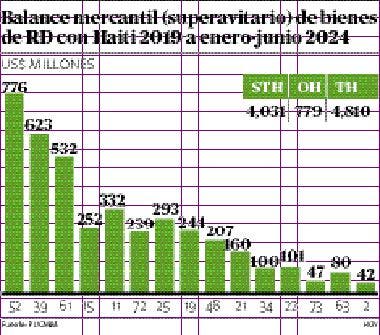He urged the design of a plan for expansion, consolidation and institutionalization of trade relations between Haiti and the Dominican Republic
Dominican-Haitian trade, from 2019 to January-June 2024, obtained a significant surplus of US$4.81 billion, distributed as US$2.81 billion in the national regime and US$1.775 billion in the free zone regime.
This surplus contributes 6.26% to the reduction of the country’s total trade deficit with the rest of the world.
In the same period analyzed, the country’s trade balance of goods accumulated a net deficit of US$79,889 million, largely composed of the negative imbalance recorded in the national regime (-US$89,359 million), since the industrial free zone and temporary admission regimes successively tabulated positive balances of US$13,206 million and US$1,263 million.
This total red figure was equivalent to the resulting differential between the global imported value (US$137,116 million), which was much higher than the general exported amount (US$60,227 million), that is, almost US$2.28 imported for every US$1.00 exported, highlighted the economist and researcher, Luis Humberto Vargas, from the Haiti Studies Unit (UEH) of the Padre José Luis Alemán, SJ Studies Center of the PUCMM.
Vargas stressed that the Dominican-Haitian market contributes to the generation of a surplus that serves to reduce the excessive net trade deficit of the Dominican economy with the rest of the world economy and, furthermore, supports production, marketing and employment in the Dominican-Haitian border markets.
He called for the design, formulation and execution of a plan for the expansion, consolidation and institutionalization of trade relations in goods and services in both Haiti and the Dominican Republic, in order to improve the standard and quality of life of the populations, and to encourage productive and labor activities and maintain collaboration in both nations.















